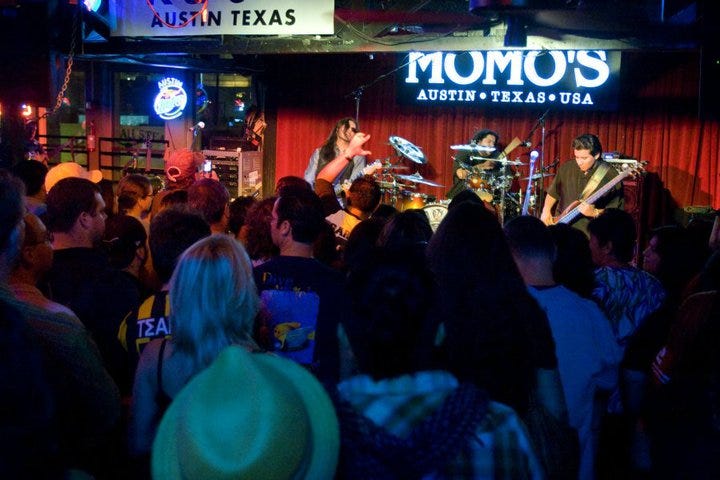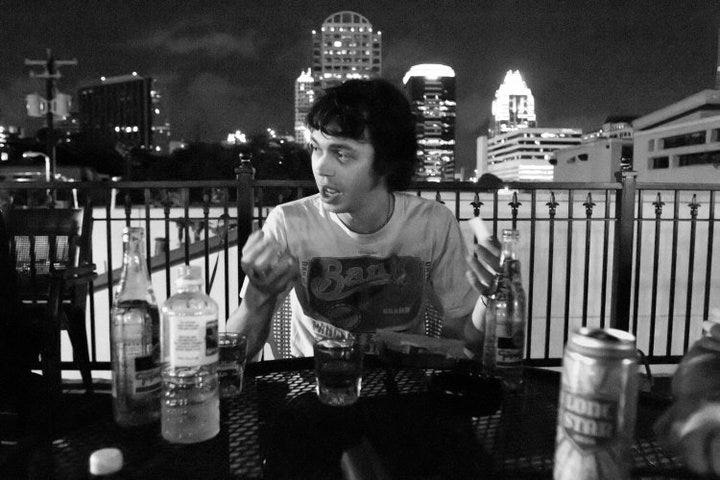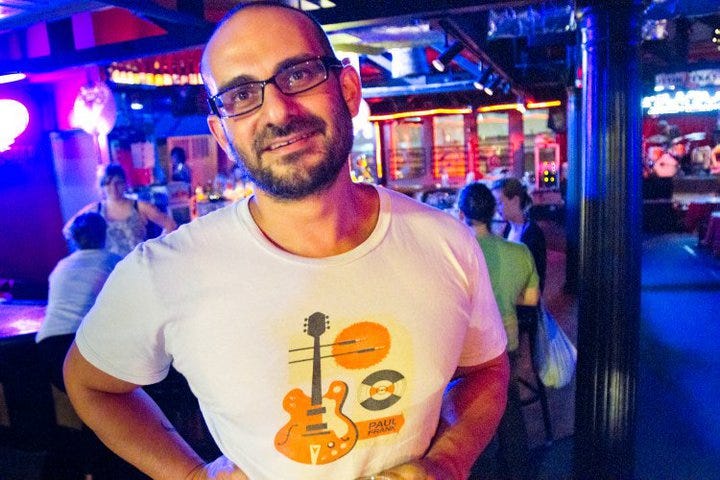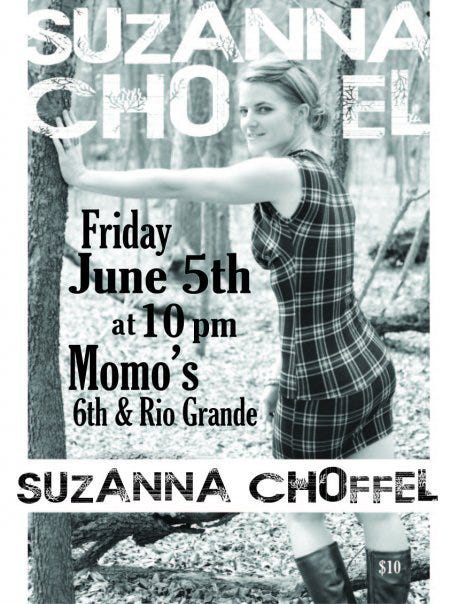Upstairs Scenes: Momo's and Chicago House
Continuing the "Clubland Paradise" series of Austin's greatest clubs ever
MOMO’S 2000-2011
Paul Oveisi bought Momo’s, above Katz’s Deli on W. Sixth St., from John “Mellow Johnny” Korioth and Chris Ruhling in December 2000. The name, according to Korioth, came from Rat Pack gangster pal Sam Giancana’s nickname.
Those hardcore bicyclists underestimated how much simple stairs would keep people away, and lasted only eight months. Oveisi was a lawyer with a civil litigation firm, who decided that what he really wanted to do was run live music venues- and lucked out with the greatest patio in town. Especially after the 2005 indoor smoking ban.
Before Momo’s, it was upscale jazz club Top of the Marc, owned by deli king Marc Katz. Opening in Aug. 1989 with the piano/bass duo of Polk & Beans (James Polk and Beans Richardson), the club had a pretty impressive run of almost 11 years, putting national jazz acts in a 340-capacity room. After closing in March 2000, Top of the Marc left behind much of the furniture, which gave Momo’s a more elegant feel than the usual rock club. But then you had redhead Ruby Collins at the bar, opening beer bottles by the arm-full like Dangerous Toys were about to go on.
It took a couple years for Momo’s’ identity to reveal itself. The singer-songwriters had too much room, and the alternative metal acts had too much sound. The first band to really make sense there was South Austin Jug Band, who packed Sunday nights, starting in 2002. With Warren Hood on fiddle, Matt Slusher on mandolin, Will Dupuy on standup bass and the songs and laconic phrasing of James Hyland, SAJB appealed to both the taco hats at UT and jamband groovers. Thank you, Jennifer Cook, for dragging me up there from Opal Divine’s across the street. (Remember when Sixth and Rio Grande wasn’t the d-bags domain?)
In those early years, Tuesday nights belonged to Del Castillo, a flamenco rock band that packed the place with dancing fans.
Momo’s can claim future platinum act Los Lonely Boys, booking the Garzas when nobody besides Freddy Fletcher knew who the hell they were. Willie Nelson stopped by one night to hear the band his nephew Freddy was about to sign.
Bit by the club bug big-time, Oveisi made a couple of financial mistakes in 2002, buying the troubled Metro club on Sixth Street (whose owner Paresh Patel went-and stayed- missing in 2000) and renaming it Six of Clubs, then taking over Steamboat in the future La Bare building. The mystery of why so many clubs have failed at the prime location of Riverside and Congress is solved when you see a utility bill.
Oveisi decided to concentrate on Momo’s and to chair the Live Music Task Force that helped venues and the city to better work together.
The Momo’s glory years were the mid-2000s, when Suzanna Choffel was the queen and Band of Heathens the kings. But let’s not forget T-Bird and the Breaks, a top-flight soul band which played its first-ever gig at Momo’s and had lines down the alley a month later. The Belleville Outfit took over the newgrass scene after SAJB broke up.
It was a great room that, like Top of the Marc, made it to year 11. The belch of death was when Nate Paul’s World Class Capital bought the building at 618 W. Sixth in 2011. While renovating the former Katz’s space, a support beam was removed, buckling Momo’s floor. Rather than fight a new landlord who saw the future in bottle service, Oveisi settled his lease and moved to NYC, where he opened the ZirZamin listening room.
He's been back in Austin where he Choffel are raising their two daughters. His Cosmic Coffee on South Congress was an instant success.
CHICAGO HOUSE 1987-1995:
There used to be an upstairs coffee shop with singer-songwriters on Trinity at Sixth Street called Chameleon’s, but it opted out of the jungle after two years and moved to Brodie Oaks in ‘86. The relocation couldn’t save it, however, and Chameleon’s closed after less than a year on South Lamar.
That left Jimmy LaFave without a place to play. Nobody else in town would book the Stillwater, OK singer-songwriter who tucked his jeans into his boots like an Okie would, so two of the four Chameleon’s partners- Glynda Cox and Peg Miller- got the lease back at 607 Trinity. They took the name of the railroad workers hotel built in 1842 at that location.
“LaFave literally was the impetus for Chicago House to open,” Miller told the Statesman in ‘89. Comparing his songwriting to Bob Dylan, with “the best voice you have ever heard,” Miller said she and Cox “couldn't believe (LaFave) wasn't getting gigs. We thought, ‘this is insane.’”
Chicago House opened in June 1987 and somehow made it eight years, with Cox and Miller clawing for survival every step of the way, even bagging up aluminum cans to pay the electric bill. After six months they were able to renegotiate their $3,000 a month lease, but the duo never cut back on their commitment to provide a stage that nurtured talent, not just in music, but theater, poetry and dance.
Just 10 months after they opened, the lesbian couple was attacked one night walking to their car, with Cox stabbed 14 times with a screwdriver. But they were back on Trinity as soon as they were able, with Miller at the soundboard and Cox at the door.
If the Broken Spoke seems incongruous amongst the condos of South Lamar, consider a folk music club in the middle of a bass-thumping Sixth that was just starting to get Dirty. But on a good night, Chicago House made you feel like you were in Greenwich Village in the ‘60s. Besides LaFave, regulars included Tish Hinojosa, so hot with Estrella Noche (1991) on Watermelon; a 19-year-old kid from San Angelo named Will T. Massey, who would soon be signed to MCA and co-produced by Roy Bittan of the E Street Band; former attorney David Rodriguez, returning to his songwriting roots with Man Against Beast, a 15-song cassette recorded live at Chicago House in 1990; and Jo Carol Pierce, a crisis hotline operator whose musical monologue Bad Girls Upset by the Truth brought her national recognition- and a tribute album- as a songwriter of rare depth and humor.
Austin is not a special music town for what happens in the big venues or weekend festivals. It’s the small places on weeknights, like when Alejandro Escovedo, still smarting from the breakup of the True Believers, found out his songs didn’t need to hide behind electric guitars.
Not solely for nervous first-stagers, the Chi House open mic, which added Monday to Wednesday in year two, was also where veteran songwriters would unveil new songs, much like name-standups working out material in comedy cellars. Bluesman Chris Thomas King was signed to Warner Brothers based, in part, on a performance at the Chicago, but he kept coming back to open mics to keep his songs sharp and to soak up what he could from others.
“It was like a competition among songwriters,” Barb Donovan said in Kathleen Hudson’s 2013 book Women in Texas Music. “There was nothing in your world but writing the next song… I don’t think a club has matched that energy since.”
LaFave ran the Wednesday open mic until his career took off with an album he recorded live at Chicago House in 1991. The breakout track on Austin Skyline was a beautifully heartbreaking cover of “Walk Away Renee,” a ‘60s pop hit by the Left Banke. Every songwriter’s nightmare was having to follow that at a guitar pull.
The album’s timing was good for LaFave because a year earlier, 107.1 FM changed formats from smooth jazz to an Adult Alternative Album playlist with KGSR. As Joe Gracey had done before him at KOKE-FM, KGSR’s program director Jody Denberg put an emphasis on local artists, so Joe Ely and Eliza Gilkyson held their own with Bob Dylan and Emmylou Harris. As the format, also called Americana, gained stations across the country, programmers checked KGSR's song rotation for tips on what to add, giving national airplay to not only LaFave, whose original “Only One Angel” lit up request lines, but other local acts like Ruthie Foster, Ray Wylie Hubbard, Slaid Cleaves, Jimmie Dale Gilmore, and Kelly Willis.
"It's amazing how you can slowly build your following for 10 years, then you get a little airplay and `Boom!' the next thing you know, your shows are packed and people are buying your record," LaFave told me in ‘92.
But he never forgot Sweet Home Chicago House, returning to play benefits, or just dropping in unannounced to unveil a couple newbies. The rent and the Sixth Street hassles got too high, and the House was forced to close in 1995. Eight years is a miracle when you’re not booking for bar sales.
The three heroes most responsible for “the atmosphere that produced a mountain of songs” (Donovan), all passed away in their 60s. But what a lasting impact was made by Glynda Cox, Peg Miller and the singer-songwriter with the soulful whisper that inspired them to build the House of song.










I can go on... When my first record came out on Homestead which was in New Jersey, I think.
I really didn’t know how things worked. I don’t recall knowing anyone at the label. But, I do remember one phone conversation where somebody said that the record was selling really well in Austin. And they kept getting re-orders from Waterloo records.
Strange…
Years later Alejandro told me, “Bro, I sold so many copies of that Brother Aldo CD when I worked at Waterloo“. It was Al. He was a one man plugger.
This was… 1991 92?? I don’t know…
Our first out of town gig was at the CONGRESS HOUSE on Trinity. Prior to that, we hadn't really played outside of San Francisco. And we didn’t know that the record had any reach. But that little show got written about in the Statesman. And people seemed to know the songs… It was strange. And really encouraging.
I never knew the history of Chicago House. It seemed like it had been there forever when I arrived in 92. Me, Jimmy, Claude and Dr. Ron Byrd had a band for a minute called The Grackles that played there. I did some bullwhip poetry readings occasionally. At the open mics I met a newly arrived Ed Hamel when he had hair and a rhinestone yamaka. In fact I think he shaved his head after hanging out with three head shaven Grackles. Met Beaver Nelson there. And LaFave of course. The guy who managed the place was an incredible songwriter. Can't remember his name at the moment. I loved that place. And still of all the places that we’ve lost since that one hurts the most.